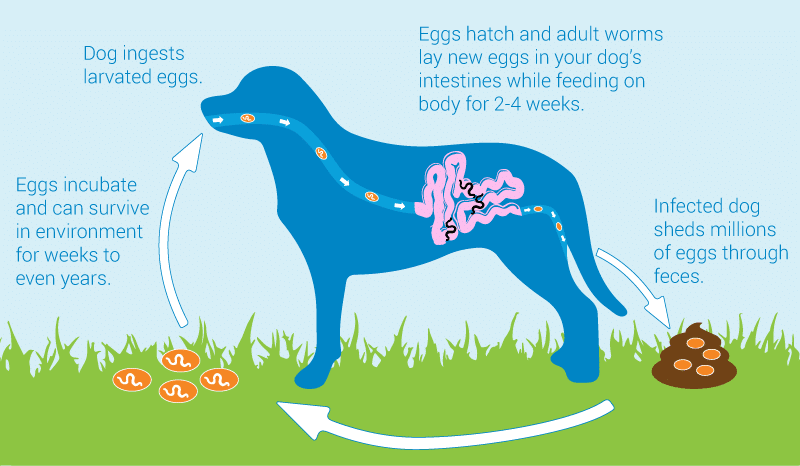Coccidia and Giardia in Your Puppy: A Complete Guide


Coccidia and Giardia in Your Puppy: A Complete Guide
Who we are and why we are the authority on bulldog health issues

We have devoted the last 15 years to improving the health of the English Bulldog breed in the United States. Instead of following the current unhealthy breed standards, we set out to change the breed for the better, focusing on lighter wrinkles, slightly longer snouts and extensive health testing. Through years of dedication we have been able to significantly improve the health characteristics within our bloodlines and give hope to the breed that health improvements are possible. Along the way, we have also become thought leaders in proper bulldog training, care and behavioral studies.
Designed for survival
If your puppy tests positive for a parasite – most commonly coccidia or giardia, you are probably wondering how an infection like this is possible, who or what is to blame, and what the best treatment is. It’s quite the surprise to suddenly learn your sweet pup could be infected with an intestinal parasite. The following information outlines how a parasite like coccidia or giardia behaves and the best treatments to eliminate them from your pup’s intestinal tract.
The first truth to remember is that the parasitic – canine relationship is slightly more normalized than our 1st world minds like to admit. Intestinal parasites and canines have existed for thousands of years together. Parasites – due to their unique lifecycle are designed to survive and thrive in mammals like dogs and rely on their host to continue their species life cycle. This isn’t to say we want to ignore a positive parasite test, rather understand that parasite treatment is a normal part of every responsible breeder.
Check Out Our Instructional Video About Giardia and Coccidia
The Intestinal Parasite Life Cycle

Giardia and Coccidia
Intestinal parasites like giardia and coccidia participate in a circle of life that relies on a mammal host like a dog. The cycle begins often when an adult dog ingests parasitic cysts from a blade of grass, water, or really any host organism in the outdoors. Consumed feces, infected water dishes and blades of grass are common locations where dogs ingest parasitic cysts. The cysts move to the intestinal tract where they transform into Trophozoites which is their feeding and reproductive stage. During this time period the adult Trophozoite duplicate and multiply. After the reproductive stage most Trophozoite return to their cyst stage and leave the intestinal tract via feces with the goal of infecting another animal. Further, some consumed cysts never leave the intestinal tract and only release during the nursing phase of a female dog with newborn puppies. The puppies are then infected through milk supply.
Other Parasites
Other parasitic worms like tapeworms and roundworms follow a very similar life cycle as coccidia and giardia but are often not as resistant to medication and are much easier to eliminate.
A Responsible Breeder’s Tension with Coccidia and Giardia Puppy Management
The simplest way to eliminate parasites from a puppy is treatment and isolation. In fact, in an isolated and sterile environment the spread of parasites would theoretically be eliminated. This looks like cold, drop deck wire cages where puppies sit alone from one another. Naturally, this type of environment goes against many of our socialization and environmental values that we have as a responsible breeder. As an ethical bulldog breeder, we want our puppies and adult bulldogs to engage, play and be mentally stimulated by one another. This means that littermates will always interact and live amongst one another along with their mother. We create these types of environments because we care about the social and mental development of our bulldogs. A social bulldog is a happy bulldog! Isolation should not ever be used as a tool to reduce parasites. While this is the most effective strategy for parasite management, the mental development of bulldog puppies comes first. Instead, timing and a correct preventative medication should be utilized to eliminate parasites like giardia and coccidia.

Bruiser Bulldog’s Step by Step Solution to Eliminate Coccidia and Giardia.
By far the most important factor is risk reduction. Infection hotspots like consumed feces and infected water dishes need to be eliminated. We understand that a clean environment leads to a reduction of parasitic infection risk. By maintaining a clean environment our bulldogs naturally run a lower risk of reinfection. Cleanliness is important!
- Timely, Comprehensive Parasite Prevention Treatment
The main parasites that affect puppies and adult dogs are the following: roundworms, hookworms, lungworms, whipworms, tapeworms, and the two most commonly stubborn parasites – giardia and coccidia. Because such a wide range of potential parasites exists, an effective prevention plan includes multiple “modes of action”.
The following medications are useful in an effective parasite treatment plan
Pyrantel: Safe for puppies under 6 weeks old. Treats roundworms and hookworms
Toltrazuril: Specializes in Coccidia treatment. Albon is also used to treat coccidia but from our 15 years of experience is appears toltrazuril is superior.
Fenbendazole: Treats a wide variety of parasites. Is for more mature puppies. Effective against roundworms, hookworms, lungworms, whipworms and tapeworms as well as semi effective against Giardia.
Metronidazole: Effective against giardia
Metro/Fenbendazole: Very effective against giardia
The key to an effective treatment plan is using the correct medication at the correct time. Many parasites (coccidia and giardia) are cyst-like in nature during certain portions of their life cycle and are immune to treatments during this time. Only consistent, multi-week treatment plans can effectively eliminate these types of parasites. The following is our current puppy and adult treatment plan:
Puppies
Week 2, 4, and 6 – Pyrantel (1 dose)
Week 7 and 9 – Metronidazole/Fenbendazole (5 days)
When the puppy goes home – Metronidazole/Fendbendazole (We send medication home with our adopters because often the stress of the ride home activates cysts in the intestinal tract and is a perfect time to medicate).
Week 6 and 10 – Toltrazuril (1-3 days)
Adult Bulldogs
Odd months of the year – Toltrazuril
Even months of the year – Metronidazole/Fenbendazole
As you can see there is quite a bit of effort and orderliness in effectively preventing parasites like coccidia and giardia in puppies. Our goal is to never send a puppy home that is infected with a parasite. By nature, these parasites are sometimes difficult to entirely eliminate if their cyst form stay attached to the intestinal tract for long periods of time. The random nature of this behavior adds to the difficulty of treatment.

The Correct Stool Sample is Vital!
When a puppy goes to their new adopter home a vet check with an accompanied stool sample is usually required. During this process it is important to remember there are two very different types of stool samples.
Fecal Float Test
A normal fecal float is standard during the initial puppy exam.
During a fecal float, your puppy’s feces will be placed under a microscope and analyzed for cysts that indicate infection. This type of test effectively detects ACTIVE infection of a parasite. A fecal test is an important and vital test to ensure that the breeder( Bruiser Bulldogs!) has effectively eliminated all parasites from your puppy. We support this type of parasite test as it is important to double check and ensure a parasite did not slip past our prevention plan.
Antigen Test: Commonly called an Eliza or PCR test
On rare occasions a vet will improperly use an Antigen test for parasite detection. An antigen test tracks the parasite history of the animal by detecting trace elements of parasites in the pup’s intestinal tract from up to 6 months in the past. It is important to note that the test records positive for parasites “antigens” that are detected regardless if this was a past or active infection. An antigen test is an inaccurate and unreliable test to give to a young puppy that has already undergone a rigorous parasite prevention plan. It is assumed that almost all puppies have been at some point infected by a parasite due to their lifecycle and will test positive for this test.
Admittedly, the administering of antigen tests by vet clinics is a source of frustration. Often vet clinics will unethically use the positive antigen test to undergo an additional round of parasite prevention medication and monthly fecal tests while painting the breeder as irresponsible. This behavior is often a manipulative, money driven method of controlling clients through fear. Just because a puppy has had a parasite in it’s past does not mean it is actively infected. Of course the antigen test came back positive. This makes perfect sense if we understand that parasite life cycle. We have found this type of behavior as problematic, indicating the vet clinic in question should not be trusted.
Additional Facts about Giardia and Coccidia
Coccidia:
- Protozoan Parasite: Coccidia are single-celled protozoan parasites that primarily infect the intestinal tracts of animals, including dogs, cats, and other mammals.
- Species Diversity: There are various species of Coccidia, with different species infecting different animal hosts. In dogs and cats, the most common species is Isospora canis and Isospora felis, respectively.
- Lifecycle: Coccidia have a complex lifecycle involving both sexual and asexual stages. They reproduce within the cells lining the intestine, leading to the shedding of oocysts (eggs) in the feces, which can then infect other animals.
- Environmental Resistance: Coccidia oocysts are highly resistant to environmental conditions and can survive for extended periods in the environment, making them a persistent threat to animals in contaminated areas.
- Transmission Routes: Transmission of Coccidia typically occurs through ingestion of contaminated food, water, or soil containing infective oocysts. Direct contact with infected feces is another common route of transmission.
- Age Susceptibility: While Coccidia can infect animals of any age, puppies and kittens are particularly susceptible due to their immature immune systems. Stressful conditions can also increase susceptibility to infection.
- Clinical Signs: Infected animals may exhibit symptoms such as diarrhea (which can sometimes be bloody), vomiting, lethargy, and poor appetite. Severe cases can lead to dehydration and weight loss.
- Diagnosis: Diagnosis of Coccidia infection is typically made through fecal examination, where the presence of oocysts is detected microscopically. Veterinarians may perform specialized tests such as fecal flotation or PCR for accurate diagnosis.
- Treatment: Treatment of Coccidia infection usually involves anti-parasitic medications such as sulfonamides or potentiated sulfas. Supportive care, including fluid therapy, may also be necessary in severe cases.
- Prevention: Preventing Coccidia infection involves maintaining good hygiene practices, such as cleaning and disinfecting living areas regularly, minimizing contact with potentially contaminated environments, and promptly treating infected animals.
Giardia:
- Flagellated Protozoan: Giardia is a flagellated protozoan parasite that infects the small intestine of mammals, including dogs, cats, and humans.
- Distinctive Shape: Giardia has a distinctive pear or teardrop shape with a concave ventral side and a convex dorsal side. It moves with a characteristic tumbling motion due to its flagella.
- Common Worldwide: Giardia is one of the most common intestinal parasites found in humans and animals worldwide. It is known to cause diarrheal illness in both humans and animals.
- Zoonotic Potential: Certain species and strains of Giardia have zoonotic potential, meaning they can be transmitted between animals and humans. This underscores the importance of proper hygiene and sanitation measures.
- Cyst Form: Giardia exists in two forms: the trophozoite (active) and the cyst (inactive). The cyst form is environmentally resistant and can survive for extended periods in water and soil, serving as a source of infection.
- Transmission Routes: Transmission of Giardia occurs through ingestion of cysts via contaminated food, water, or direct contact with infected feces. It can also be transmitted through contaminated surfaces or objects.
- Intermittent Shedding: Infected animals may intermittently shed Giardia cysts in their feces, making diagnosis challenging. Multiple fecal examinations may be necessary to detect the parasite accurately.
- Symptoms: Clinical signs of Giardia infection in animals include diarrhea (which can be intermittent), vomiting, weight loss, and lethargy. Some infected animals may not show any symptoms.
- Diagnosis: Diagnosis of Giardia infection is typically made through fecal examination, where the presence of cysts or trophozoites is detected microscopically. Alternatively, rapid diagnostic tests and PCR-based assays are available for accurate diagnosis.
- Treatment: Treatment of Giardia infection usually involves anti-parasitic medications such as metronidazole or fenbendazole. Supportive care, including fluid therapy and dietary management, may also be necessary.
- Prevention: Preventing Giardia infection involves practicing good hygiene, such as ensuring access to clean water, avoiding contaminated environments, and promptly treating infected animals. Regular fecal examinations and deworming are also important preventive measures.
Conclusion
The natural life cycle of parasites makes them difficult to eliminate. Only an effective and orderly prevention plan, along with a clean environment can reduce the risk of parasites. We have had great success in controlling parasites like giardia and coccidia in our bulldogs by utilizing an orderly prevention plan and sticking to it.
Additional Resources
Check Out our Available Puppies Here

Bruiser Bulldog’s Reviews
